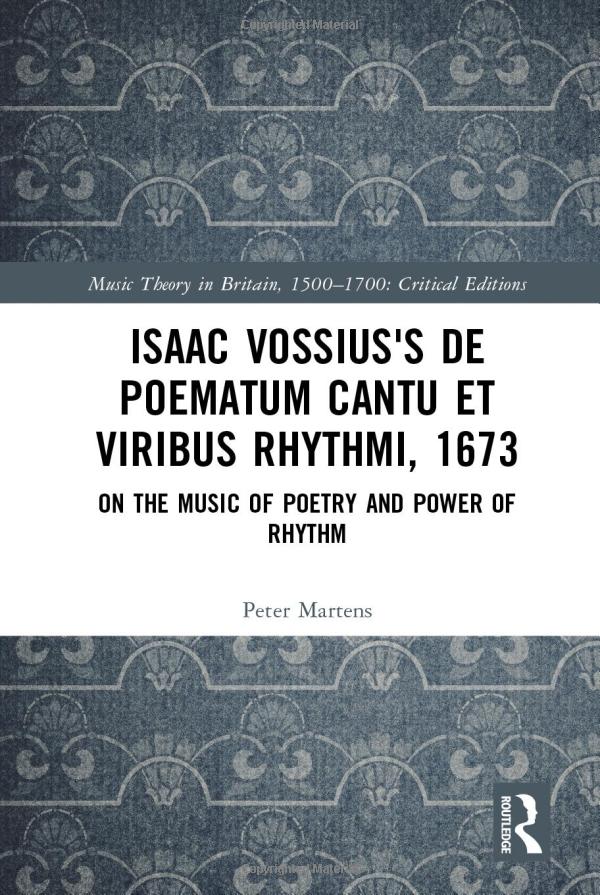Isaac Vossius's De Poematum Cantu ET Viribus Rhythmi, 1673

Book Description:
Dr Peter Martens provides the first complete edited English translation of, and commentary on, Issac Vossius's De poematum cantu et viribus rythmi, a late seventeenth-century work of Continental musical humanism, all the more interesting for being published in England and dedicated to royalist Henry Bennett, Duke of Arlington. This treatise plays an important but poorly understood role in the continued development of rhythmopoeia; Vossius continues the arguments of figures such as Vincenzo Galilei and Marin Mersenne - desiring to link linguistic rhythm, music, and the passions - by proposing a practical, if undemonstrated, method for doing so based on ancient poetic feet. This resuscitation of poetic feet in the service of affect is made explicit by Vossius, but is undoubtedly more familiar to musicologists from Wolfgang Caspar Printz's 1696 Phrynis Mitilenaeus or Johann Mattheson's 1739 Der vollkommene Capellmeister. Vossius, or more correctly, De poematum cantu, was often cited during the century after its publication, and no modern treatment of rhythmopoeia seems complete without a citation or short excerpt from this work. There is little secondary literature that focuses on this treatise, but what does exist links this work directly to John Dryden's composition of his 1687 and 1697 St. Cecilia odes, and their musical settings by Giovanni Battista Draghi and Jeremiah Clarke, respectively. In Dean Mace and H. Neville Davies' debate over the extent of Vossius's influence on these works can be found a rich picture of the contentious issues surrounding text-setting and musical affect that so occupied a great many writers in late-seventeenth-century England. A full translation and accompanying discussion of Vossius's own sources and musical influences allows English-language students and scholars to access and study this work in the depth and to the degree it deserves.

Author Bio:
Dr. Martens' research investigates the communication of musical rhythm and meter as a compositional, performative, and perceptual joint venture. His work in this area has appeared in journals such as Music Perception and Music Theory Online, and as the chapter "Musical Structure: Time and Rhythm" in the 2017 Routledge Companion to Music Cognition. He has presented this blend of music theory, music cognition, and performance analysis to organizations such the Society for Music Theory (SMT), the Society for Music Perception and Cognition (SMPC) - for which he served as Program Chair for the 2019 meeting in New York City, and the International Conference on Music Perception and Cognition (ICMPC). Dr. Martens' other primary research interest is historical music theory, and he is the author of the edited translation Rhythm, Text, and the Recovery of the Past: Isaac Vossius's 1673 De poematum cantu et viribus rythmi (On the Music of Poetry and Power of Rhythm)(Routledge Press, 2022).
In Texas, Dr. Martens served as President of the Texas Society for Music Theory from 2015-2018, and is Co-Director (with Dr. David Sears) of the Performing Arts Research Lab at Texas Tech (TTU-PeARL). Lab personnel were recently awarded a $10,000 Arts in Medicine grant to study the effect of music on the recognition of facial emotion in neurotypical and autism-spectrum populations, a joint project with TTU's Burkhart Center. In the Fall of 2017, Dr. Martens assumed the role of Associate Director for Graduate Programs in the TTU School of Music, and in 2020 became the Associate Dean for Faculty, Research and Creative Activity in the Talkington College of Visual and Performing Arts.
Humanities Center
-
Address
Texas Tech University, 2508 15th Street, Weeks Hall 221, Lubbock, TX 79409-1002 -
Phone
806.742.3028 -
Email
humanitiescenter@ttu.edu
